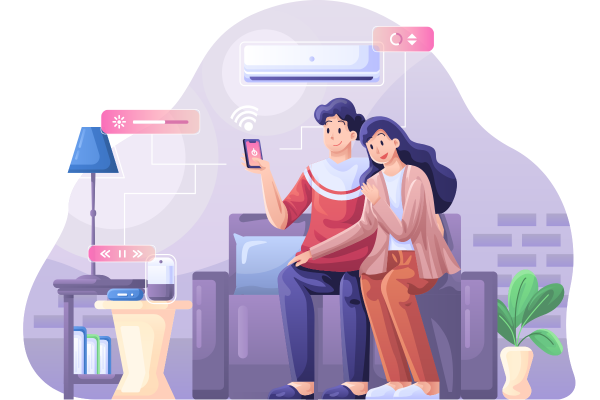Unleashing the AI Revolution: Smart Homes
Category: 5G Technology
Introduction:
Today, in our rapidly changing world, technology is constantly changing the way we experience life. A prime example of this is the smart home, a system that links different gadgets and machines to establish a more convenient, effective, and safe living space. Whether it's using your voice to control your lights or remotely overseeing security cameras, smart homes represent cutting-edge innovation in the modern era. But what exactly defines a smart home, and how does it improve our daily routines?
What is a Smart Home?
A smart home is a dwelling equipped with internet-connected devices that allow for remote management and monitoring of various systems, including lighting, heating, appliances, security cameras, and entertainment setups. These devices can be controlled using smartphones, tablets, or voice commands through smart assistants like Amazon Alexa, Google Assistant, or Apple Siri.
The fundamental idea behind a smart home is automation, which allows for the scheduling, customization, and control of devices based on inpidual preferences. For example, you can schedule your lights to dim at specific times, adjust your thermostat to regulate the temperature when you're away from home, or receive alerts when your security system detects unusual activity.
Key Components of a Smart Home:
A smart home typically consists of a wide range of connected devices, including:
- Smart Lighting Systems: Using a smartphone or voice commands, you can manage the lighting in your home. Adjust the lights' brightness, switch colours, or create automated lighting schedules to align with your daily activities.
- Smart Thermostats: The Nest Thermostat and similar devices adapt to your preferences and automatically regulate the temperature, which assists in conserving energy and ensuring maximum comfort.
- Smart Security Systems: Never before has home security been so easy to obtain. Real-time monitoring, motion detection, and even facial recognition features are provided by smart cameras, doorbells, and alarms, all accessible through your smartphone.
- Smart Speakers and Voice Assistants: Amazon Echo and Google Home serve as the central control units for your smart home, enabling music playback, reminder setting, device control, and answering queries.
- Smart Appliances: Smart appliances simplify daily chores and improve efficiency, such as refrigerators that send notifications when you run out of milk and washing machines that can be started from a distance.
- Smart Locks: Traditional keys are a thing of the past. With smart locks, you can remotely lock and unlock doors, give temporary access to guests, and keep track of who comes in and out of your home.
Benefits of Smart Homes:
- Convenience: Controlling everything with a few taps on your smartphone or through voice commands is one of the major benefits of a smart home. There's no need to be concerned about leaving the lights on or forgetting to lock the door anymore.
- Energy Efficiency: Adjusting to your schedule and habits, smart thermostats and lighting systems aid in decreasing energy consumption. Unused devices can be turned off by automated systems, which assists in saving on electricity bills.
- Enhanced Security: Smart home security systems provide homeowners with peace of mind through real-time surveillance and immediate alerts. With features such as remote locking, motion detection, and smart doorbells, you can keep an eye on your home from anywhere.
- Customization: Tailoring smart homes to your specific needs and preferences is possible. You can have full control over how your home operates, from setting personalized lighting moods to controlling the temperature in different rooms.
- Remote Monitoring: Even while you're away from home, you can keep an eye on and manage your smart home. This adds a level of convenience and security, guaranteeing that you always have control over your home.
The Future of Smart Homes:
The potential of smart homes in the future is extremely promising. Artificial intelligence (AI) is anticipated to have a more significant role in improving home automation, enabling devices to understand and adjust to your routines more accurately. Furthermore, there are expectations of smart cities and interconnected ecosystems emerging, which will link homes with broader city infrastructure, establishing more effective urban living environments.
In addition, there is a growing emphasis on sustainability. Smart homes will incorporate more environmentally friendly technologies, such as energy management systems that optimize the utilization of renewable energy sources, contributing to a more sustainable planet.
Conclusion:
The concept of the smart home is no longer something from the future – it's a reality that's changing the way we live today. By incorporating intelligent devices into our homes, we can experience increased convenience, security, and energy efficiency. While challenges such as cost and privacy persist, the ongoing advancements in smart home technology are making it a feasible and beneficial investment for homeowners worldwide.
As we progress into a more interconnected world, smart homes are poised to become the standard way of living, where technology and comfort work together to establish a seamless and effective lifestyle.
